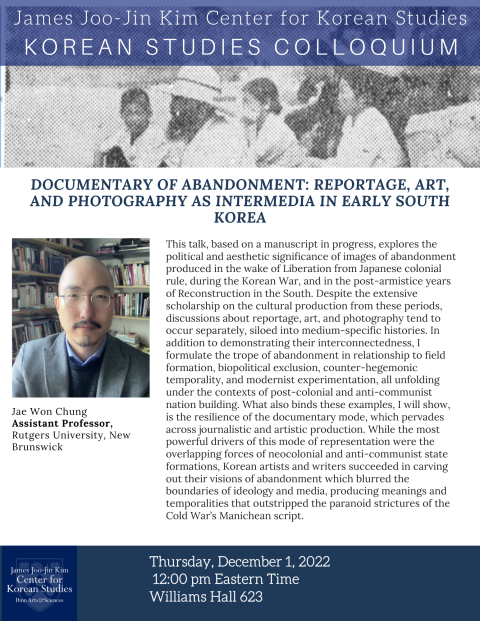
Korean Studies Colloquium
Williams Hall 623
This talk, based on a manuscript in progress, explores the political and aesthetic significance of images of abandonment produced in the wake of Liberation from Japanese colonial rule, during the Korean War, and in the post-armistice years of Reconstruction in the South. Despite the extensive scholarship on the cultural production from these periods, discussions about reportage, art, and photography tend to occur separately, siloed into medium-specific histories. In addition to demonstrating their interconnectedness, I formulate the trope of abandonment in relationship to field formation, biopolitical exclusion, counter-hegemonic temporality, and modernist experimentation, all unfolding under the contexts of post-colonial and anti-communist nation building. What also binds these examples, I will show, is the resilience of the documentary mode, which pervades across journalistic and artistic production. While the most powerful drivers of this mode of representation were the overlapping forces of neocolonial and anti-communist state formations, Korean artists and writers succeeded in carving out their visions of abandonment which blurred the boundaries of ideology and media, producing meanings and temporalities that outstripped the paranoid strictures of the Cold War’s Manichean script.
Jae Won Edward Chung is an assistant professor in the Department of Asian Languages and Cultures and an affiliate faculty of the Program in Comparative Literature at Rutgers University-New Brunswick. He received his B.A. from Swarthmore College and M.F.A. and Ph.D. from Columbia University. He previously taught at the University of Colorado Boulder and Ewha University. His writing has appeared in Journal of Asian Studies, Journal of Korean Studies, Azalea, Boston Review, and Asymptote.
 James Joo-Jin Kim Center for Korean Studies
James Joo-Jin Kim Center for Korean Studies